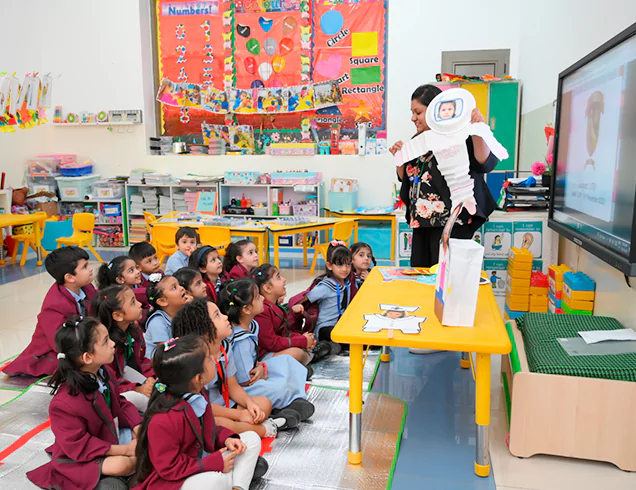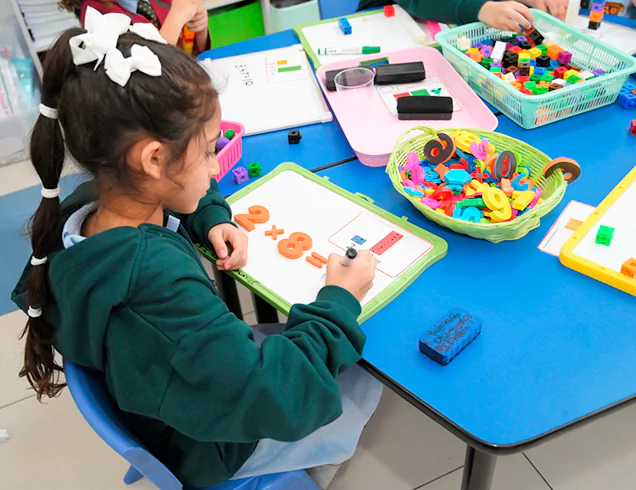Early Years Foundation Stage (EYFS)
The EYFS offers flexible and quality education to help meet statutory requirements, delivered by specialist sector experts, and based on specialist knowledge and understanding of all aspects of early years and childcare, a thorough understanding of provision in EYFS.
The prime areas of learning in EYFS are based on Communication and Language, Physical Development (PD), Personal, Social, and Emotional Development (PSED), Literacy, Numeracy, Understanding the World (UTW) and Expressive Arts and Design (EAD). Throughout the year, teachers and practitioners will observe the development of children and track their progress in the age / stage bands, to understand the needs of individuals. Progress is monitored on the individual tracker. Outcomes shall be shared with parents, together with a short commentary on each child's skills and abilities in relation to the three key characteristics of effective learning.

Cambridge International Primary Programme (CIPP)
The Cambridge International Primary Programme gives schools all over the world, the framework to develop Mathematics, English and Science Knowledge and skills in young children. The Primary Programme provides guidance for curriculum development and classroom teaching and learning, and it allows teachers to assess children’s learning as they progress. CIPP consists of several components that fit together to provide the schools with tools they can use to help their students acquire knowledge and skills.
The CIPP comprises:
The Cambridge Primary Curriculum Framework – to help teachers develop high quality programmes for teaching young children English, Mathematics and Science.
The Cambridge Primary Progression Tests – available for the last 4 years of primary education and designed to allow teachers and parents to follow the progress of their students over time and analyse performance within their classes and against an international external benchmark.
The Cambridge Primary Checkpoint Exams – to be taken by students at the end of their final year of primary education. CIE will moderate these tests and issue students with Certificates of Achievement.

Cambridge Lower Secondary Programme (CLSP)
The Cambridge Lower Secondary Programme is a framework for increasing educational success for students in Grades 6 to 8 (Key Stage 3). This programme builds on the primary stage and develops student’s knowledge and skills in Mathematics, English and Science. It also provides us with a means of tracking student progress through the lower secondary phase, with an integrated package of teaching, learning and assessment materials.
At the end of Grade 6 and 7 students take the Progression Tests in Mathematics, English and Science. These are designed to allow teachers and parents to follow the progress of their students over time and analyse performance within their classes against an external benchmark. These Progression Tests lead on from the CIPP tests of Grades 3 to 5.
At the end of Lower Secondary (Grade 8), students appear for Cambridge Checkpoint tests, which provide detailed feedback on students’ strengths and weaknesses before they move into the Key Stage 4, IGCSE. It also provides a fair assessment of how well an individual student will do in the IGCSE examinations for the stated subjects.

IGCSE
The secondary school curriculum at TBAC is anchored by the International General Certificate of Secondary Education (IGCSE), an external examination programme designed for 14 to 16-year-olds (Grades 9 and 10) and based upon the Cambridge International Curriculum.
The IGCSE at TBAC provides a broad programme of study in areas such as languages, Social Studies, Science, Mathematics, and Vocational subjects. In each subject, there is a balance between practical and theoretical knowledge but the emphasis in almost all subjects is skills related to that subject. The curriculum is designed so that students can use examples related to their own experiences. The nature of the programme is such that students of different abilities can follow it. Further, it is designed for students whose first language may not be English.
Students appear for examinations at the end of the IGCSE course, usually in Grade 10. These examinations are marked by experienced external examiners appointed by CIE.
IGCSE is recognised internationally. This programme prepares students for further academic courses which would be followed in Grade 11 and 12 at school. CIE is a division of the University of Cambridge Local Examinations Syndicate which is part of the University of Cambridge. UCLES has developed and promoted qualifications at a variety of levels for at least 150 years.

AS / AL
Cambridge International A Level is the world’s most popular international examination for 17 & 18 year old. As one of the most recognised qualifications around the world, it is accepted as proof of academic ability for entry to universities worldwide. Cambridge International A Levels typically takes two years to complete and offers a flexible course of study that gives students the freedom to select subjects that are right for them. There are five passing grades (A–E). Minimum matriculation requirements are at least two pass grades. Good A Level grades can be a key to admission for the entire world’s major Anglophone universities. University course credit and advanced standing is often available in countries such as the UK, USA and Canada. Good grades in carefully chosen A Level subjects can result in up to one full year of credit. Advanced Subsidiary (AS) Level represents the first half of a full A level course and gives students the opportunity of studying a broader range of subjects without committing to doing a full A Level. As with A Levels, these enable students to apply successfully to universities throughout the world.



